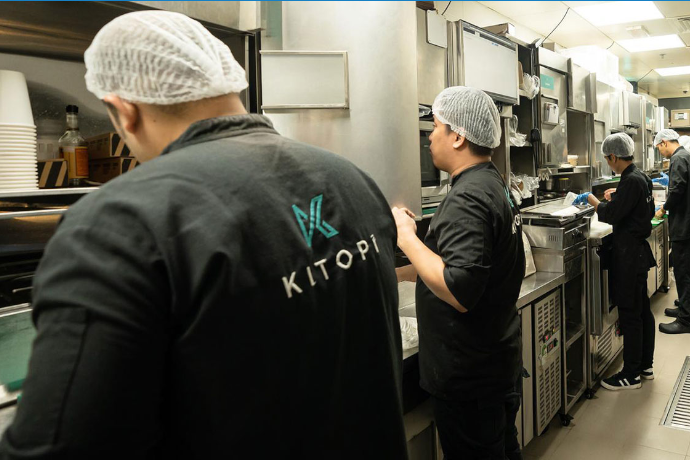Kitopi (Kitchen Operations) is a startup that operates in the food technology industry. It stands for “Kitchen as a Service” and offers a platform that helps restaurants and food brands expand their delivery capabilities without having to establish their own physical kitchen spaces.
Kitopi provides a cloud kitchen infrastructure where restaurants can outsource their cooking operations, allowing them to focus on other aspects of their business such as branding, marketing, and customer service. The company sets up and manages shared commercial kitchens equipped with advanced technology and culinary expertise.
By partnering with Kitopi, restaurants can increase their delivery reach and efficiency by tapping into Kitopi’s network of strategically located kitchens. The startup takes care of food preparation, cooking, and packaging, enabling restaurants to fulfill delivery orders quickly and reliably.
Kitopi also offers a proprietary technology platform that helps manage orders, inventory, and logistics, allowing partner restaurants to monitor and optimize their operations. They provide real-time data analytics and insights to help restaurants make informed decisions and enhance their delivery services.
Overall, Kitopi aims to revolutionize the food delivery industry by providing a cost-effective and efficient solution for restaurants to expand their delivery operations, streamline their processes, and enhance the customer experience.
Founding Story and History of Kitopi
Kitopi was founded in January 2018 by Mohamad Ballout, Saman Darkan, Bader Ataya, and Andres Arenas. The four founders met while working at McKinsey & Company, where they were all consultants. They saw an opportunity to help restaurants scale and increase their delivery reach and sales, without them having to worry about breaking the bank (with the CAPEX and OPEX).

Kitopi is a managed cloud kitchen platform. This means that they provide restaurants with all the infrastructure they need to operate, including kitchens, equipment, staff, and marketing. Restaurants simply need to focus on creating their food and branding.
The founders of Kitopi had a unique perspective on the food industry. They had seen how difficult it was for restaurants to scale, and they knew that there was a need for a better way. They also had experience in technology, which they knew would be essential for building a successful cloud kitchen platform.
Kitopi’s founders started the company with a small investment from their own savings. They rented a small kitchen in Dubai and began working with a few restaurants. They quickly realized that there was a strong demand for their services, and they began to grow rapidly.
In the early days, Kitopi faced a number of challenges. They had to build their own technology platform, and they had to train their staff on how to operate the kitchens. They also had to convince restaurants to give them a chance.
However, Kitopi’s founders were persistent, and they were able to overcome these challenges. They built a strong team, and they developed a technology platform that was second to none. They also built relationships with restaurants, and they were able to convince them that Kitopi was the best way to scale their businesses.
Kitopi has grown rapidly since its inception. In 2021, they raised $415 million in a Series C funding round led by SoftBank Vision Fund 2. This valuation of over $1 billion made Kitopi a unicorn.
Kitopi is now one of the leading cloud kitchen platforms in the world. They have kitchens in over 20 cities across the Middle East, North Africa, and Europe. They also have plans to expand to the United States and Asia.
Business Model of Kitopi
In the rapidly evolving world of food delivery, Kitopi has emerged as a game-changing startup. Kitopi’s unique business model, known as “Kitchen as a Service,” offers a disruptive solution to restaurants and food brands looking to expand their delivery operations without the burden of establishing their own physical kitchens. Let’s dive into the details of Kitopi’s innovative business model and how it is revolutionizing the food delivery industry.
Shared Cloud Kitchens
At the heart of Kitopi’s business model are its shared cloud kitchens. These commercial kitchen spaces are strategically located in various cities, designed to optimize delivery reach and efficiency. Instead of individual restaurants setting up their own kitchens, Kitopi provides a cost-effective alternative by offering shared infrastructure, allowing multiple restaurants to operate from the same location. This shared model enables Kitopi to maximize kitchen utilization and resources, reducing overhead costs for partner restaurants.
Kitchen Management Services
Kitopi goes beyond providing physical kitchen space. It also offers comprehensive kitchen management services to its partner restaurants. This includes hiring and training kitchen staff, sourcing ingredients, managing inventory, and overseeing food preparation. By outsourcing these operations to Kitopi, restaurants can focus on core aspects of their business such as menu innovation, branding, and customer service. Kitopi’s expertise and experience in managing kitchens ensure streamlined operations and consistent quality across all partner restaurants.
Technology Platform
To efficiently manage the complex operations of multiple kitchens, Kitopi has developed its proprietary technology platform. This platform acts as a central hub for order management, inventory control, and logistics optimization. Restaurants can monitor and track their delivery orders in real-time, ensuring seamless coordination between the kitchen, delivery personnel, and customers. The platform also provides valuable data analytics and insights, empowering restaurants to make data-driven decisions and continuously improve their delivery services.
Expanded Delivery Reach
Partnering with Kitopi allows restaurants to significantly expand their delivery reach. With shared kitchens strategically located in different areas, restaurants can tap into new customer segments and enter markets they couldn’t reach before. By leveraging Kitopi’s infrastructure and delivery expertise, restaurants can extend their presence without the need for additional physical locations. This expanded delivery reach opens up new revenue opportunities and enhances overall business growth.
Benefits for Customers
Kitopi’s business model not only benefits partner restaurants but also delivers value to customers. By streamlining operations and optimizing delivery logistics, Kitopi ensures faster and more reliable delivery service. Customers can enjoy a wider range of food options from various restaurants, all consolidated under a single platform. Kitopi’s commitment to quality and consistency ensures a consistently delightful customer experience, with the added convenience of timely and efficient deliveries.
Kitopi’s “Kitchen as a Service” business model has transformed the food delivery landscape, offering a scalable and cost-effective solution for restaurants and food brands. By providing shared cloud kitchens, comprehensive kitchen management services, and a robust technology platform, Kitopi enables partner restaurants to expand their delivery operations and improve customer satisfaction. As Kitopi continues to innovate and expand its reach, it is poised to shape the future of food delivery and redefine the way restaurants approach their delivery strategies.
Revenue Streams of Kitopi – How does Kitopi Make Money?
As Kitopi disrupts the food delivery industry with its innovative “Kitchen as a Service” model, understanding its revenue streams becomes crucial. Kitopi has developed a diversified approach to monetizing its services, catering to both partner restaurants and customers. In this article, we will explore the revenue streams that drive Kitopi’s growth and sustainability.
Kitchen Rental Fees: One of Kitopi’s primary revenue streams comes from charging partner restaurants rental fees for utilizing its shared cloud kitchens. Restaurants pay a fee based on the kitchen space they occupy and the duration of their partnership with Kitopi. By offering a cost-effective alternative to establishing and managing their own kitchens, Kitopi generates a steady stream of income from its partner restaurants.
Kitchen Management Services: Kitopi provides comprehensive kitchen management services to its partner restaurants, including staffing, sourcing ingredients, and inventory management. In return, Kitopi charges service fees for these operational activities. The fees may be structured based on the volume of orders processed or a percentage of the partner restaurant’s revenue. This revenue stream ensures that Kitopi is compensated for its expertise in running efficient and well-managed kitchens.
Technology Platform Fees: Kitopi’s proprietary technology platform plays a crucial role in streamlining operations, managing orders, and optimizing logistics. The platform provides valuable insights and analytics to partner restaurants, enabling data-driven decision-making. To access and utilize this technology platform, Kitopi charges subscription or licensing fees to its partner restaurants. This revenue stream reflects the value provided by Kitopi’s tech infrastructure and the continuous support and development of the platform.
Delivery Commission: As part of its end-to-end solution, Kitopi manages the delivery process for partner restaurants. When orders are placed through Kitopi’s platform, the company charges a commission fee on each delivery. This fee is typically a percentage of the order value and compensates Kitopi for its delivery logistics, coordination efforts, and customer service. The delivery commission revenue stream aligns Kitopi’s interests with the success of its partner restaurants’ delivery operations.
Upselling and Cross-Selling: With its diverse range of partner restaurants, Kitopi has the opportunity to engage in upselling and cross-selling activities. By featuring specific dishes or promotions from partner restaurants on its platform, Kitopi can earn additional revenue through commissions on the increased sales generated. This approach benefits both Kitopi and partner restaurants by boosting visibility and driving customer engagement.
Data Monetization: Kitopi’s technology platform collects valuable data on customer preferences, order patterns, and operational insights. Aggregated and anonymized data can be analyzed to identify trends and provide valuable market intelligence. Kitopi can leverage this data to offer insights and analytics services to its partner restaurants or even third-party organizations, generating additional revenue through data monetization strategies.
Kitopi’s revenue streams are multifaceted, encompassing kitchen rental fees, kitchen management services, technology platform fees, delivery commissions, upselling and cross-selling, and potential data monetization. This diversified approach allows Kitopi to capitalize on its unique position as a “Kitchen as a Service” provider, delivering value to partner restaurants while ensuring its own sustainable growth in the rapidly expanding food delivery market.
Also Read: How Instant Delivery Startup Gopuff Built Its Multi Billion Dollars Empire
To read more content like this, subscribe to our newsletter
Go to the full page to view and submit the form.

